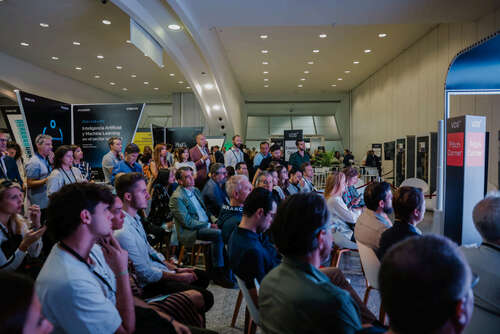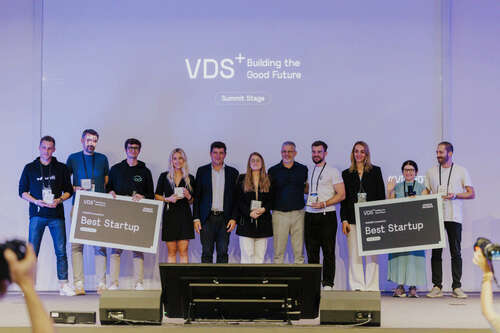Every successful tech ecosystem needs an event that brings stakeholders together — both locally and from abroad. Obviously, in Amsterdam, we have the outstanding TNW Conference (shamelessly opportunistic, we know, but here is a 30% discount on a business pass for 2024 — come say hi). In the record-pace-growth startup hub of Spain’s third-largest city, it is the Valencia Digital Summit (VDS).
As far as conference locations go, VDS definitely delivers. The futuristic aesthetic of Ciudad de las Artes y las Ciencias inevitably tickles the imagination of where tech might take us (it was used as a filming location for Star Wars spin-off Andor, after all).
The conference is supported by Startup Valencia, a non-profit organisation committed to promoting local tech entrepreneurship, scaling digital businesses, and fostering connections between academia and corporations.

While attending last week’s event, apart from enjoying the late October Spanish sunshine, we caught up with Startup Valencia’s founder as well as general partner of NextTier Ventures, Patricia Pastor, and the organisation’s CEO, Nacho Mas. We talked about how the event has grown since it first launched six years ago, what it takes to stay on course despite a shifting political landscape, and the keys to keep growing the ecosystem over the coming years.
Public sector alignment
One of the crucial factors is the alignment between the public and private sectors, Mas and Pastor agree. And while administrations have come and gone throughout the years, Startup Valencia has remained a constant in identifying the needs of the ecosystem and innovation, representing the community with one voice when it comes to advocating for those needs in front of policymakers.
“To be aligned with the public sector is super important for the future of the city. Because when you work on something together, without barriers and problems, they [policymakers] can understand what we are looking for and what we want to be in the next 10 years now,” Pastor says.
Indeed, the Valencia startup ecosystem has seen impressive growth — increasing five times in value since 2015. According to Seedtable, in 2022, Valencia startups raised $64mn, or €60.5mn, in capital (after raising $57mn, or €54mn, in 2021). Until the start of October this year, they had raised $67mn, or €63.5mn — a not-insignificant vote of confidence from investors in the current funding climate.
Furthermore, the Valencian Community, with its three largest cities of Valencia, Alicante, and Castellón, has the largest number of startups per capita in Spain.

For its sixth edition, Valencia Digital Summit gathered close to 12,000 professionals from 91 different countries, breaking the attendance record for the second consecutive year. Startup Valencia, meanwhile, has 350 members and the support of the likes of Google for Startups and Valencia Port Innovation hub. Furthermore, it partners with Banco Santander, among others.
Wellbeing tech hub, in more ways than one
London has fintech, Berlin has software and AI, but what sets Valencia apart? According to Mas and Pastor, much of it revolves around health — individual and planetary.
“I think Valencia is becoming more and more the wellbeing hub,” Pastor shared. “Food tech, health tech, sports tech, but also water and energy. A lot of companies are coming together to develop a super ecosystem where we can work and live in a world of balance.”
For instance, Lakan Health uses big data and AI for personalising cancer treatment; Ndiya’s app provides nutritional advice; Quibim has developed a tool for image recognition and processing technologies to determine complex medical treatments — including partnering with Microsoft for the development of virtual biopsies. Green Urban Data provides software for cities to gather accurate data to help make decisions and prioritise in regards to climate change mitigation.
But there are also plenty of startups in the industrial and digital transformation space, and AI-supported software for all kinds of applications, with the likes of ML translation tool developer Pangeanic, recruitment scouts Talentomnia, and Voicemod, which announced a €14.5mn funding round for its voice modulation software at the start of this year.
Attracting talent to the ecosystem
Key to growing the ecosystem in the years to come, Mas said, is attracting the right talent. He is hoping that the aforementioned quality of life in the city will do just that. Valencia has 300-plus days of sunshine per year, and an atmosphere that supports a healthy lifestyle and work-life balance.
“It is really this mix of quality of life and possibility of professional development that we believe is key to attracting talent in the future,” Mas stated, while also highlighting the proximity to Madrid (1.5 hours by train), a strong industry and innovation presence, and the relationship to universities.
But Startup Valencia is also helping homegrown entrepreneurs in broadening their horizons and bringing innovation back home to the city. The organisation has a programme that supports members in going to the US, or to the LATAM area.

The winners of this year’s startup pitch competition at Valencia Digital Summit were speech-to-text analysis software company Ender Turing based in Tallinn, and one-click car care platform Cafler from Barcelona.
If the last few years have shown us anything, it is that we really have no idea what the world will look like 12 months from now. But we feel that we can say with some certainty that the innovation gathering pace in Valencia, bolstered by a stand-out ecosystem event, will not be slowing down any time soon.

